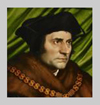 From the Tower of London
From the Tower of London
By Sir Thomas More (1478-1535), statesman, humanist scholar, and martyr during the reign of King Henry VIII of England. The text is a meditation on detachment, penned in 1534 while More was imprisoned in the Tower of London, waiting for trial and sentencing for his silence regarding Henry's break from the Church of Rome and divorce of Queen Catherine of Aragon.
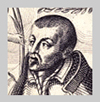 A Child My Choice
A Child My Choice
Three Christmas poems by Saint Robert Southwell SJ (1561-1595). After training as a Jesuit in France and Italy, Southwell worked as a Catholic priest under cover in his native England, and, when his ministry was discovered, was imprisoned in the Tower of London and executed for high treason. He was canonized by Pope Paul VI in 1970.
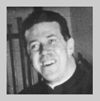 Living Under the Divine Impulse
Living Under the Divine Impulse
By Saint Alberto Hurtado SJ (1901-1952). The text is a reflection on prayer and the labors of our everyday Christian apostolate. Hurtado, from Viño del Mar, Chile, was a priest of the Society of Jesus, a lawyer, and also founder of Hogar de Cristo. Canonized on October 23, 2005 by Pope Benedict XVI, Hurtado is a patron of the poor, street children, and the nation of Chile. His feast day is August 18.
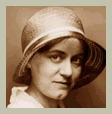 Who Are You, Sweet Light? (1937)
Who Are You, Sweet Light? (1937)
By Saint Edith Stein (1891-1942). From an observant Jewish family, Stein was a student of Edmund Husserl and, after receiving her doctorate in philosophy at the University of Göttingen, an assistant to her mentor. After a conversion experiences that led her to Catholicism, she entered the Discalced Carmelites at Cologne where she was called Sister Theresa Benedicta of the Cross. The text is a set of verses honoring the Holy Spirit. Stein was killed by the Nazis at Auschwitz and is honored as a Christian martyr by the Church.
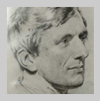 Keeping Fast and Festival
Keeping Fast and Festival
By Blessed John Henry Newman (1801-1890). The text is one of John Henry Newman's meditations on Easter Sunday -- a feast the great English preacher called "the child of sorrow," in a sermon drawing from Ecclesiastes 3:4. Newman, a native of London and a convert to Roman Catholicism from the Church of England, was created a cardinal by Pope Leo XIII in 1879 and, on September 19, 2010, beatified in a ceremony in Birmingham England by Pope Benedict XVI. His canonization as a saint by Rome hinges upon proof of a second major miracle attributable to his intercession.
 The Night of the Soul
The Night of the Soul
By Saint Thérèse de Lisieux (1873-1897). The text is excerpted from L'Histoire d'une Âme. Born in Alençon in the Orne department of Normandy in France, and christened Marie Françoise-Thérèse Martin, she joined the Carmelite order at Lisieux, also in Normandy, at the young age of 15. She died there of tuberculosis at the age of 24. Her spiritual autobiography was published quickly thereafter, in 1898. Canonized in 1925 by Pope Pius XI and declared a Doctor of the Church by Pope John Paul II in 1997, Thérèse's feast is celebrated annually on October 1 (October 3 in the Melkite Rite). She is a patroness of both France and Russia, in addition to missionaries, sufferers from HIV/AIDS and tuberculosis, and those grieving the loss of their parents.
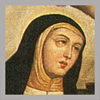 Do Not Lose Heart
Do Not Lose Heart
By Saint Teresa of Àvila (1515-1582). The text is excerpted from the "Second Mansions" section of Interior Castle by Saint Teresa of Ávila, patroness of Spain, laceworkers, headache sufferers, and many others. The daughter of a knight of Jewish descent, born and raised in the central Spanish province of Ávila, Teresa entered a Carmelite monastery there at the age of twenty. Later on, beginning in her late forties, she led the reform of her religious order, establishing Discalced Carmelite houses throughout Spain. A mystic who was among the earliest European women to author an autobiography, Teresa was friends with Saint John of the Cross and other figures associated with the Catholic Reformation. She was canonized by Pope Gergory XV in 1622 and named a Doctor of the Church by Pope Paul VI in 1970.
 Letters Home
Letters Home
By Saint Damien of Molokai (1840-1889). The text contains excerpts from the letters home of the patron of lepers and outcasts. Christened Jozef de Veuster in his native village of Tremelo in the Dutch-speaking part of Belgium, he took the name of Damiaan as a novice of the Congregation of the Sacred Hearts of Jesus and Mary in Leuven. In 1864, was sent as a missionary to Honolulu, Hawaii, and in 1873, he volunteered to serve a leper colony on the island of Molokai -- where there were a number of Catholics who wanted the sacraments -- knowing he would probably catch leprosy and die there. He did not catch the disease until 1885 and continued serving until his death on April 15, 1889. He was canonized in Rome on October 11, 2009. He is buried at Sint Antonius Kapel in Leuven where pilgrims may visit his tomb in the sanctuary.
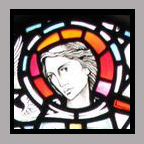 Altus Prosator
Altus Prosator
By Saint Columba of Iona (521-597). The text is an abecedarian hymn "Altus Prosator" by the a monk from Donegal in ancient Ireland who founded an abbey at Iona in Scotland, carrying Christianity to that country. Also known as Columcille, Columba was among the pioneers of a larger movement of missionary monastics from the British Isles who spread and helped strengthen Christian community throughout Western Europe in the sixth through eighth centuries.
 The Divine Dilemma and its Solution
The Divine Dilemma and its Solution
By Saint Athanasius of Alexandria (c. 296-373). The text is excerpted from On the Incarnation. Born to a well-to-do Christian family in Alexandria in what was then
the Roman province of Egypt, Athanasius as a young theologian at the Council of
Nicea in 325 was crucial in defending and articulating a Trinitarian Christology -- enshrined in the Nicene Creed -- against Arian views. He was eventually appointed bishop of Alexandria. He is honored as a Doctor of the Church by Roman Catholics and is also honored as a saint in the Oriental and Eastern Orthodox churches, as well as by Lutherans and the Anglicans. His feast day in the Roman calendar is May 2; Eastern Orthodox Christians celebrate him on January 18.
 True Wisdom and Love
True Wisdom and Love
By Saint Robert Bellarmine SJ (1542-1621). The text is from the devotional text, The Ascent of the Mind to God by the Ladder of Created Things. Born in Montepulciano in Italy, Bellarmine began his career as a theology professor at Leuven in the Low Countries and then taught for many years at the Jesuits' Roman College, today the Pontifical Gregorian University. He was made a cardinal by Pope Clement VIII. He is known especially for his explications of Catholic doctrine in view of Protestant Reformation challenges, but he also wrote a number of devotional works. He was canonized on June 29, 1930, by Pope Pius XI and declared a Doctor of the Church. He is the patron saint of canon lawyers, catechists, and several colleges and universities.
 Without Looking for Reward
Without Looking for Reward
By Saint Angela of Foligno (1248-1309). The text is from the medieval mystic's Book of Visions and Instructions. Angela, who was born into a wealthy family in the Italian region of Umbria, was a Franciscan tertiary who, beginning around the year 1300 when she was a widowed mother in her fifties, is believed to have received mystical revelations which she dictated to a Franciscan brother. Soon after, she founded a community of religious women, devoted to charitable works and prayer, in her hometown of Foligno. She was beatified in 1701 by Pope Clement XI and canonized by Pope Francis on 9 October 2013.
 To Be a Lover of Truth
To Be a Lover of Truth
By Saint Catherine of Siena (1347-1380). The text is a letter by Saint Catherine of Siena to a law professor at the University of Bologna. Born as Caterina di Giacomo di Benincasa, along with a twin sister named Giovanna who died soon after, she entered the Dominican order as a lay, tertiary member when she was a young woman. A mystic, scholar, and forceful advocate of Pope Gregory XI's return of the Papal See to Rome from Avignon, she is also a patron saint of Europe and a Doctor of the Church.
 To All the Faithful
To All the Faithful
By Saint Francis of Assisi (1182-1226). In this letter, Francis offers reflections on the coming of Jesus Christ and exhortations to those who would follow Him. Francis, christened with the name Giovanni di Pietro di Bernardone, was canonized within two years of his death by Pope Gregory IX in 1128. He is honored is the patron of animals, the natural world, and Italy.
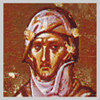 Hymn on Paradise
Hymn on Paradise
By Saint Ephrem the Syrian (c. 306-373). Born around 306 in the city of Nisibis near today's Turkish-Syrian border, Ephrem was a deacon of the Syriac church and is honored in the Syriac Orthodox tradition as one of its most influential hymnographers and theologians. Ephrem died of plague in Edessa while ministering to plague victims. He is honored by Roman Catholics as a Doctor of the Church.
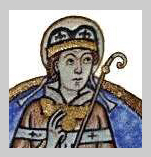 A Prayer for Friends
A Prayer for Friends
By Saint Anselm of Canterbury (1033-1109). Anselm, originally of Aosta in the Italian Alps, served the Church as Archbishop of the See of Canterbury in Norman England. The text is a prayer of intercession on behalf of his cherished friends. Anselm's canonization was formalized in 1494 by Pope Alexander VI, and in 1720, Pope Clement XI proclaimed him a Doctor of the Church.
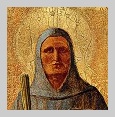 Love in the Affections and in Action
Love in the Affections and in Action
By Saint Bernard of Clairvaux (1090-1153). Originally from Dijon in France, Bernard was elected Abbot of the Cistercians at Clairvaux. The sermon is the fiftieth in his series on the biblical Song of Songs. St. Bernard was canonized in 1174 and declared a doctor of the Church by Pope Pius VIII in the early nineteenth century.
 The Light of All Lights
The Light of All Lights
By Saint Gregory Nazianzen (c. 329-390). Gregory served as Archbishop of Constantinople from 380 to 383. The text is an excerpt from one of his homilies. A trained orator and philosopher, Gregory is best known for his Trinitarian theology, which integrates Hellenistic thought with Scriptural teachings. He is venerated as a Doctor of the Church in the Roman rite and, among Eastern Christians, as one of the Three Holy Hierarchs.
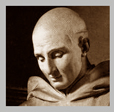 From a Wilderness in Calabria
From a Wilderness in Calabria
By Saint Bruno (c. 1030-1101). From a leading family of the German city of Cologne and for many years head of the episcopal school at Reims, Bruno was a canon, priest, learned writer on ecclesiastical topics, and founder of the monastic community of Chartreuse -- later called the Order of Saint Bruno or the Carthusians. The text is a letter to his friend Raoul Le Verd. Bruno's cult was universalized by Pope Clement X in 1674. His feast is celebrated each year on October 6.
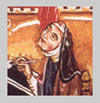 O ignis spiritus paracliti
O ignis spiritus paracliti
By Saint Hildegard of Bingen (1098-1179). The text is an ode to the Holy Spirit. We include Hildegard's original Latin along with an English translation.
 God on Earth, and Man in Heaven
God on Earth, and Man in Heaven
By Saint John Chrysostom (c. 347-407), Archbishop of Constantinople and Doctor of the Church. The text is a reflection on the meaning of Christmas, compiled from parts of four different homilies in the saint's collected writings, and adapted from one of the first English translations of these homilies.